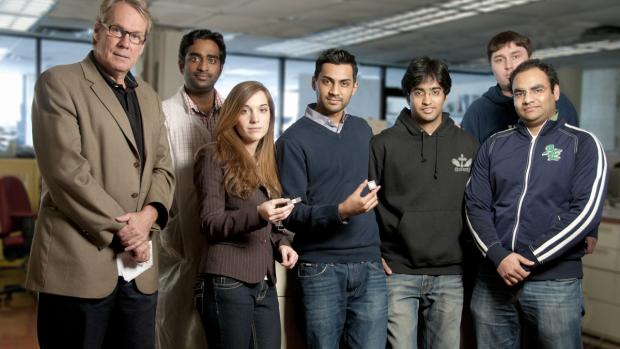Summer Just Got Hotter: NYU-Poly Students Take Top Prize in Entrepreneurs Challenge

Adding jobs to the economy will continue America’s recovery from its worst recession in decades, and alumnus Samir Ajmera, ’08, is poised to aid the effort. He intends to hire two engineers to continue researching the technology behind Anzenna, the company he helped establish with Professor Kalle Levon of the Department of Chemical and Biological Sciences at Polytechnic Institute of NYU. To fund his new hires, Ajmera will draw from the $75,000 cash prize he and his teammates won on April 29 in the Entrepreneurs Challenge held annually by NYU Stern’s Berkley Center for Entrepreneurship & Innovation.
True to its name, the competition encourages would-be moguls to test their ideas against others — just as in any marketplace — but narrows the field by requiring entrants to choose one of three areas in which to compete: new venture, social venture, and technology venture. The last is new to the competition this year and the one in which Anzenna triumphed. The company’s winning entry? A handheld transistor-based biosensor that performs rapid diagnoses of infectious diseases. Although the science behind the device has been applied to diagnostic techniques in research and academia for more than 10 years, Anzenna is the first company to commercialize the technology.
When Science Doesn’t Cut the Mustard
Making that leap to the commercial sector is possible when scientists are able to have platonic relationships with their discoveries, says Ajmera. “It’s a common problem: engineers and scientists fall in love with their technology and believe it should sell itself,” he explains. “That’s not the case.”
Technical innovation plays a smaller role than scientists believe, if or when it comes time to taking their innovation to market, according to Ajmera. “Technology is only 50 percent of the job. It’s really about the market you focus on, the business plan you have, and who you’re addressing,” he says.
His teammate Avdar San, who will graduate with a master’s degree in biotechnology and entrepreneurship from NYU-Poly this month, nods in agreement. “Science doesn’t accomplish everything by itself,” he says.
But that was the assumption members of Suneris Technologies held when they decided to enter the Entrepreneurs Challenge. “Coming in as engineers, we were, like, once we get a product that works, we’ll be fine,” says Joe Landolina, who, along with freshman Kenny Mai and junior Isaac Miller, guided Suneris against Anzenna in the finals of the technology venture competition. (Of the three finalists, two were composed primarily of NYU-Poly students; Mai and Landolina are both first-year students at NYU-Poly, while Miller studies at NYU’s Stern School of Business.)
“And we were wrong,” laughs Mai, ruefully.
Advice to the Graduate
How, then, would Suneris and Anzenna advise others who wish to participate in the Entrepreneurs Challenge? It is a competition, after all, with more than 450 registrants making up the 221 teams that began the process last September. Suneris and Anzenna pushed past them all in the eight months since, attending in that time a series of workshops about business plans, the base upon which all start-ups grow, hosted by the Berkley Center. All teams were also assigned groups of mentors who provided them with feedback on various elements of business development, such as marketing, revenue forecasts, and even how to present the business plan itself.
On that point, Suneris and Anzenna align: communication skills are a must. What helps there, says Landolina, is a healthy respect for the humanities—both studied the humanities heavily in high school and did improvisational acting. “We’re not afraid to go in front of 1,000 people or more and speak and be confident,” says Mai.
Ajmera would add storytelling ability to the mix. “Really having a systematic way of saying something and explaining the full concept” is key, he says. “That’s the number one thing you learn: that you cannot talk the way you talk to your lab buddy.”
The best advice may come from Jeffrey Carr, executive director of the Berkley Center, who reminds those considering the Entrepreneurs Challenge next fall is that “there’s research out there that shows that, if you look at successful entrepreneurs, the thing that correlates with them is how many ventures they’ve started,” he says. “Not how many that succeeded; how many they started.”
Interested students can find out more about the Entrepreneurs Challenge by visiting its page here.




